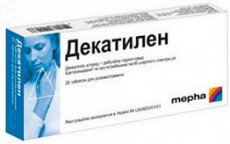Medical expert of the article
New publications
Preparations
Decatylene
Last reviewed: 03.07.2025

All iLive content is medically reviewed or fact checked to ensure as much factual accuracy as possible.
We have strict sourcing guidelines and only link to reputable media sites, academic research institutions and, whenever possible, medically peer reviewed studies. Note that the numbers in parentheses ([1], [2], etc.) are clickable links to these studies.
If you feel that any of our content is inaccurate, out-of-date, or otherwise questionable, please select it and press Ctrl + Enter.

The drug Dekatilen is an antimicrobial and local anesthetic agent for surface use in otolaryngological and dental practice. Refers to surface antiseptics.
Decatilen is approved for sale without a prescription.
Indications Decatylene
Local treatment procedures for acute pathologies of the oral cavity and nasopharynx, namely:
- catarrhal tonsillitis (in combination with other medications);
- lacunar tonsillitis (in combination with other medications);
- ulcerative-membranous tonsillitis (in combination with other medications);
- inflammation of the mucous membrane of the pharynx;
- inflammation of the mucous membrane of the larynx;
- inflammation of the palatine tonsils;
- aphthous-ulcerative inflammation of the oral mucosa;
- inflammation of the gums;
- fungal infection of the mouth and throat (in combination with other medications);
- sanitation after removal of tonsils or teeth;
- halitosis.
Release form
Decatilen is available in tablet form as white matte lozenges. The lozenges have a notch on one surface and the MERNA logo on the opposite surface.
Packages are produced that contain 20 or 100 lozenges.
Decatilen is presented by:
- active ingredients dequalinium chloride and dibucaine hydrochloride;
- additional ingredients: glucitol, talc, stearic acid, silica, flavoring agent and peppermint oil.
Pharmacodynamics
Decatilen has antimicrobial, antifungal, anti-inflammatory and hemostatic effects.
The active component of the drug exhibits activity against:
- gram (-) microorganisms - salmonella, escherichia, pseudomonas, proteus vulgaris, etc., including gram (-) cocci, such as neisseria;
- gram (+) microorganisms – bacilli, corynebacteria, mycobacteria, as well as positive cocci, including penicillin-resistant strains;
- fungal infection – actinomycetes, candida, trichophyton, treponema, etc.
The active components of Decatilen are capable of demonstrating a slight local anesthetic effect, reducing pain in inflammatory conditions, especially in the throat area.
Pharmacokinetics
The active ingredients of Decatilen are practically not absorbed into the systemic circulation, so it is not possible to study the pharmacokinetic properties of the drug.
Dosing and administration
Adults and pediatric patients over 12 years of age take 1 tablet every 120 minutes. After the signs of inflammation subside, you can take 1 tablet every 240 minutes.
Child patients from 4 to 12 years old take 1 tablet every 180 minutes, and after the symptoms subside – 1 tablet 4 times a day.
The tablet is dissolved slowly, without crushing or chewing the tablet.
The maximum daily dose of the drug is up to 12 tablets during an exacerbation, or up to six tablets during a period of symptom relief.
The duration of therapy may depend on how quickly the signs of inflammation are relieved. Most often, therapy lasts up to 5 days.
 [ 2 ]
[ 2 ]
Use Decatylene during pregnancy
There are no scientifically proven facts of the absence of danger from the use of Decatilen during pregnancy, as well as no data that the drug has any negative effect on the course of pregnancy and the health of the baby. From this it follows that the use of the drug during pregnancy and breastfeeding is possible, but only with the permission and under the strict supervision of a doctor.
Contraindications
Decatilen is not recommended for use:
- in pediatrics in children under 4 years of age;
- the body's tendency to allergies to ammonium compounds or other components of the drug;
- with caution - during pregnancy and breastfeeding.
 [ 1 ]
[ 1 ]
Side effects Decatylene
Among the side effects of Decatilen, only the development of allergic symptoms in the form of itchy rashes, swelling and redness of the skin are distinguished.
Overdose
There is no data on Decatilen overdose.
Storage conditions
Store the tablets in dry places, out of reach of children, at a temperature of no more than 25°C.
Shelf life
Shelf life: no more than 3 years.
Attention!
To simplify the perception of information, this instruction for use of the drug "Decatylene" translated and presented in a special form on the basis of the official instructions for medical use of the drug. Before use read the annotation that came directly to medicines.
Description provided for informational purposes and is not a guide to self-healing. The need for this drug, the purpose of the treatment regimen, methods and dose of the drug is determined solely by the attending physician. Self-medication is dangerous for your health.

